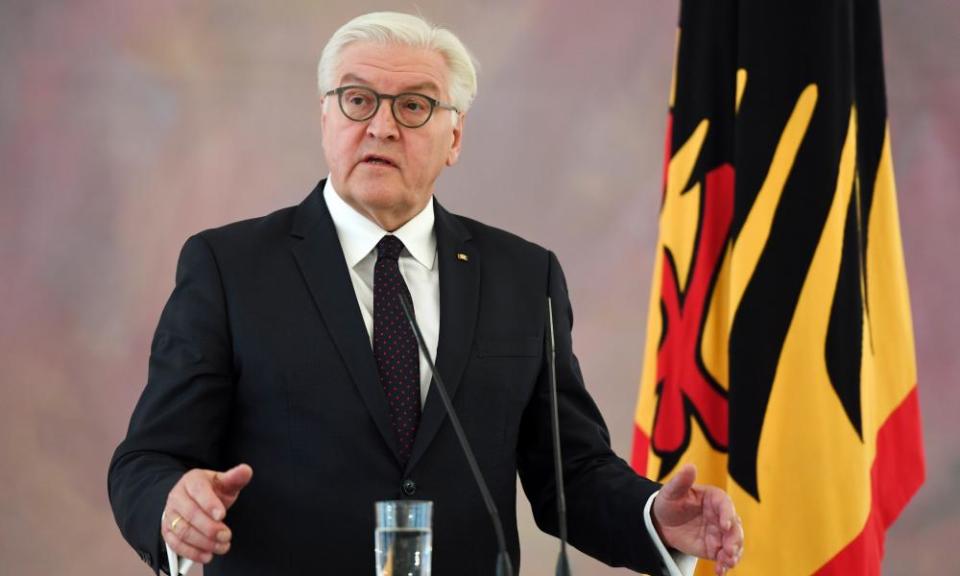Germany's president to urge Green and FDP leaders to restart talks

Germany’s president met party leaders on Tuesday after talks to form a new government between Angela Merkel’s conservative bloc, the left-leaning Greens and pro-business Free Democrats (FDP) broke down at the weekend.
The collapse of coalition talks poses the most serious threat to Merkel’s position since she became chancellor more than a decade ago.
The president, Frank-Walter Steinmeier, has called on political leaders to rethink their positions and try again to form a government. Meetings with the leaders of the Greens and the FDP’s Christian Lindner were held on Tuesday. Neither party spoke after their meeting.
The centre-left Social Democrats (SPD) – Merkel’s partners in the outgoing government – say they will not budge from their refusal to enter a new Merkel administration. If that stands, a minority government or a new election are the only options.
Martin Schulz, head of the SPD, is due to meet Steinmeier on Thursday.
While German media are assigning at least some of the blame for the collapse of talks to the chancellor, Merkel has exuded calm over the last two days and appeared to have even consolidated her authority within her party.
According to the weekly newspaper Die Zeit, even Christian Democrat (CDU) members who have been openly critical of her course during the refugee crisis have praised Merkel’s conduct during the coalition talks. “Angela Merkel is prepared to stay. And her party is as united in supporting her as it hasn’t been in ages,” it reported.
A putsch in Merkel’s CDU looks less likely than in the Social Democrats, where some members are more open to the idea of another “grand coalition” than their leader, Martin Schulz.

Wolfgang Schäuble, the former finance minister, appeared to nod towards the Social Democrats on Tuesday when he appealed to all parties to take a constructive role in solving the deadlock. “Europe and many other states in the world are waiting for us”, said Schäuble, who is president of the German parliament.
Peter Altmaier, the acting finance minister and a close confidant of Merkel, called on the parties to not run away from their responsibility but “make forming a government the primary objective”.
Exploratory talks to form the next German government collapsed on Sunday night after the pro-business FDP walked out of marathon negotiations with the CDU, their Bavarian sister party, the Christian Social Union, and the Green party.
CDU and Green negotiators on Monday stressed the common ground that had emerged between the two parties during the weeks of talks and focused their criticism on the FDP leader.
Lindner left the talks on Sunday saying the parties involved had missed several self-prescribed deadlines to resolve differences on migration and energy policies, and had “no common vision for modernisation of the country”.
Merkel, who has led three coalitions since 2005, said she was very sceptical about ruling in a minority government and suggested she would stand again as a candidate if elections were called in the new year, telling the public broadcaster ARD she was “a woman who has responsibility and is prepared to take responsibility in the future”.
In the centre-right Die Welt newspaper, the commentator Thomas Schmid argued that the largest share of the blame for the government paralysis lay with the chancellor.
“She has spend weeks practising with her famously passive patience. She moderated. As far it is known, she did not add any of her own impulses to the talks or lend it momentum,” he said.
“The Merkel method has come to an end. There’s no alternative: until today, that has been her motto. It has allowed her to gain formidable victories, especially on the international stage. But both internationally and nationally it has driven a depoliticisation of politics that has become especially evidence in the parliament’s loss of purpose.”
While new elections look increasingly likely, they are not expected to be called for another month. Germany’s constitution requires the president to nominate a chancellor for approval by the German parliament, the Bundestag. Only when no stable government can be formed after three rounds of voting there would the president ask Germans to return to the polls.
Over the next two to three weeks there will further talks between parties to explore whether another governing constellation is possible on the basis of the September vote.
Merkel’s problem is that even fresh elections in 2018 may not yield a more dynamic result. Snap polling on Monday indicated a broadly similar outcome to the September vote, with only the Greens profiting from the events of the last month: a survey by polling institute Insa has the party on 12%, up from 8.9% in September.
The collapse in the talks and possibility of fresh elections brings further uncertainty for the British government over Brexit. It had hoped that a strong German coalition, including the FDP, might help smooth the next phase of negotiations.
Prolonged uncertainty in Berlin will also raise concerns in France, where Emmanuel Macron was hoping that a strong German government would help with his plans for eurozone reforms. “It is not in France’s interest for things to get blocked,” the French president said at the start of a meeting with Bernard Accoyer, a leader of France’s opposition Les Républicains party.
Steinmeier previously appealed for German politicians to think of Europe as he called for coalition talks to resume. “There would be incomprehension and great concern inside and outside our country, and particularly in our European neighbourhood, if the political forces in the biggest and economically strongest country in Europe, of all places, didn’t fulfil their responsibility,” he said.

 Yahoo News
Yahoo News 